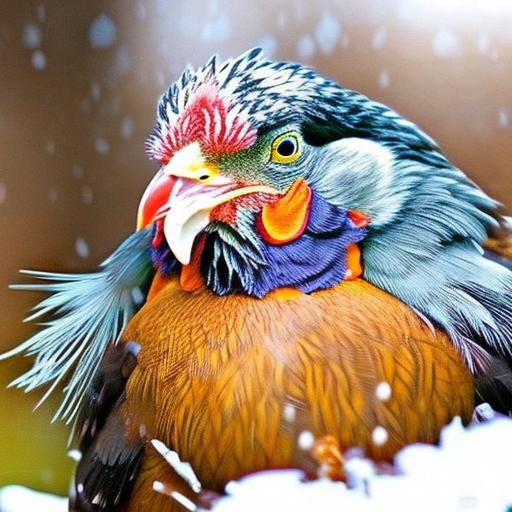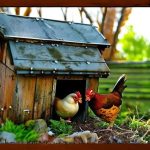Keeping chickens warm during winter is crucial for their health and well-being. As the temperatures drop, chickens are more susceptible to cold-related illnesses and discomfort. It is important for chicken owners to take the necessary steps to ensure that their feathered friends are kept warm and comfortable during the winter months.
Key Takeaways
- Keeping chickens warm during winter is crucial for their health and egg production.
- Insulating the chicken coop and providing proper ventilation are key to maintaining a comfortable temperature.
- Adding natural light to the coop can help regulate the chickens’ internal clocks and promote egg laying.
- Choosing the right bedding material, such as straw or wood shavings, can provide insulation and absorb moisture.
- Using heat lamps or heaters should be done with caution and monitored closely to prevent fires and overheating.
Understanding the Importance of Keeping Chickens Warm During Winter
Chickens need to be kept warm during winter because they are not able to regulate their body temperature as efficiently as mammals. Unlike humans, chickens do not have sweat glands, which means they cannot cool themselves down when they get too hot or warm themselves up when they get too cold. This makes them particularly vulnerable to extreme temperatures.
If chickens are not kept warm during winter, they can suffer from a variety of health issues. One common problem is frostbite, which occurs when the chicken’s comb, wattles, or feet are exposed to freezing temperatures for an extended period of time. Frostbite can cause tissue damage and lead to infection if left untreated.
Another risk of not keeping chickens warm is respiratory problems. Cold air can irritate the delicate respiratory system of chickens and make them more susceptible to respiratory infections. Additionally, chickens that are exposed to cold temperatures for prolonged periods of time may experience a decrease in egg production.
Insulating Your Chicken Coop
Insulating the chicken coop is essential for keeping chickens warm during winter. Insulation helps to retain heat and prevent drafts from entering the coop. There are several insulation materials and methods that can be used.
One common insulation material is straw or hay. These materials provide excellent insulation and can be spread on the floor of the coop to create a warm bedding area for the chickens. Another option is to use insulation boards or foam panels to line the walls of the coop. These materials provide a barrier against cold air and help to maintain a consistent temperature inside the coop.
It is also important to insulate the windows and doors of the coop. This can be done by using weatherstripping or caulking to seal any gaps or cracks. Insulating the roof of the coop is also important, as heat rises and can escape through an uninsulated roof.
Providing Proper Ventilation
While insulation is important for keeping chickens warm, it is equally important to provide proper ventilation in the chicken coop. Good ventilation helps to remove moisture and ammonia from the coop, which can build up and cause respiratory problems for the chickens.
There are several ventilation options for chicken coops. One option is to install vents near the top of the coop to allow hot air to escape. These vents should be covered with wire mesh to prevent predators from entering the coop. Another option is to use adjustable vents that can be opened or closed depending on the weather conditions.
It is important to strike a balance between insulation and ventilation in the chicken coop. Too much insulation without proper ventilation can lead to a buildup of moisture and ammonia, while too much ventilation without adequate insulation can result in drafts and cold air entering the coop.
Adding Natural Light to the Coop
Natural light is important for chickens as it helps to regulate their internal clock and promote healthy egg production. During winter, when daylight hours are shorter, it is important to provide additional light in the chicken coop.
There are several ways to add natural light to the coop. One option is to install windows or skylights in the coop. These allow natural light to enter the coop during the day. Another option is to use artificial lighting, such as LED bulbs, to supplement natural light. These bulbs can be set on a timer to mimic natural daylight hours.
It is important to note that chickens need a period of darkness for rest and sleep. It is recommended to provide 8-10 hours of darkness per day for chickens.
Choosing the Right Bedding Material

Choosing the right bedding material for chickens is important for their comfort and health. Bedding helps to insulate the coop and provide a soft and dry surface for the chickens to walk and rest on.
Straw and hay are commonly used as bedding materials for chickens. They provide good insulation and absorb moisture well. However, they can become damp and moldy if not replaced regularly.
Another option is wood shavings or chips. These materials are absorbent and provide good insulation. They also have the added benefit of being easy to clean and replace.
It is important to avoid using materials such as newspaper or cardboard as bedding, as they do not provide adequate insulation and can become damp and moldy.
Using Heat Lamps or Heaters
In some cases, additional heat may be necessary to keep chickens warm during winter. Heat lamps or heaters can be used to provide supplemental heat in the chicken coop.
Heat lamps should be hung at a safe distance from flammable materials and should be securely fastened to prevent them from falling. It is important to monitor the temperature in the coop regularly to ensure that it does not get too hot or too cold.
When using heat lamps or heaters, it is important to follow safety precautions. Never leave heat lamps unattended and make sure they are securely fastened. It is also important to keep electrical cords out of reach of chickens to prevent them from getting tangled or pecking at them.
Feeding Your Chickens the Right Diet
Feeding chickens the right diet is important during winter to help keep them healthy and maintain their body temperature. Chickens require a balanced diet that includes a mix of grains, protein, vitamins, and minerals.
During winter, it is important to provide additional calories to help chickens maintain their body temperature. This can be done by increasing their feed ration or providing high-energy treats such as cracked corn or black oil sunflower seeds.
It is also important to provide a source of calcium, such as crushed oyster shells, to help maintain eggshell quality. Chickens may require additional vitamin and mineral supplements during winter, especially if they are not able to forage for insects and greens.
Providing Fresh Water
Providing fresh water is crucial for chickens during winter. Chickens need access to clean and unfrozen water to stay hydrated and maintain their body temperature.
There are several ways to keep water from freezing in cold weather. One option is to use heated waterers or heated bases that prevent the water from freezing. These can be plugged into an electrical outlet and provide a constant source of unfrozen water.
Another option is to use insulated waterers or water heaters that can be filled with warm water. These can help to prevent the water from freezing for a longer period of time.
It is important to check the water regularly to ensure that it has not frozen and to clean the waterers regularly to prevent the buildup of bacteria.
Monitoring Your Chickens’ Health and Comfort Level
Monitoring your chickens’ health and comfort level is important during winter. Cold weather can put additional stress on chickens, making them more susceptible to illness.
It is important to observe your chickens regularly for any signs of discomfort or illness. Signs of discomfort may include huddling together, shivering, or fluffing up their feathers. Signs of illness may include lethargy, loss of appetite, or respiratory symptoms.
If you notice any signs of discomfort or illness, it is important to take action immediately. This may involve providing additional heat, adjusting ventilation, or seeking veterinary care if necessary.
Keeping chickens warm during winter is essential for their health and well-being. By insulating the coop, providing proper ventilation, adding natural light, choosing the right bedding material, using heat lamps or heaters when necessary, feeding the right diet, providing fresh water, and monitoring their health and comfort level, chicken owners can ensure that their feathered friends stay warm and healthy during the cold winter months.
If you’re looking for tips on how to keep your chickens warm during the winter, you’ll definitely want to check out this informative article on poultrywizard.com. It provides valuable insights and practical advice on creating a cozy and insulated chicken coop. From choosing the right materials to implementing effective heating solutions, this article covers everything you need to know to ensure your feathered friends stay comfortable and healthy during the colder months. For more details, visit https://poultrywizard.com/keeping-chickens/chicken-coop-nest-box/.
FAQs
What temperature range is safe for chickens during winter?
Chickens can tolerate temperatures as low as 20°F, but it is recommended to keep their coop temperature between 30-50°F.
What are the signs of hypothermia in chickens?
Signs of hypothermia in chickens include lethargy, huddling together, shivering, and a decrease in egg production.
How can I keep my chicken coop warm during winter?
You can keep your chicken coop warm during winter by insulating the walls and roof, using a heat lamp or ceramic heater, providing plenty of bedding, and sealing any drafts.
What bedding materials are best for keeping chickens warm?
Bedding materials such as straw, hay, and pine shavings are good options for keeping chickens warm during winter.
Can I use a space heater to keep my chicken coop warm?
It is not recommended to use a space heater in a chicken coop as it can be a fire hazard. Instead, use a heat lamp or ceramic heater specifically designed for use in a coop.
How often should I check on my chickens during winter?
It is recommended to check on your chickens at least twice a day during winter to ensure they have enough food and water and to monitor their health and comfort.
Meet Walter, the feathered-friend fanatic of Florida! Nestled in the sunshine state, Walter struts through life with his feathered companions, clucking his way to happiness. With a coop that’s fancier than a five-star hotel, he’s the Don Juan of the chicken world. When he’s not teaching his hens to do the cha-cha, you’ll find him in a heated debate with his prized rooster, Sir Clucks-a-Lot. Walter’s poultry passion is no yolk; he’s the sunny-side-up guy you never knew you needed in your flock of friends!







